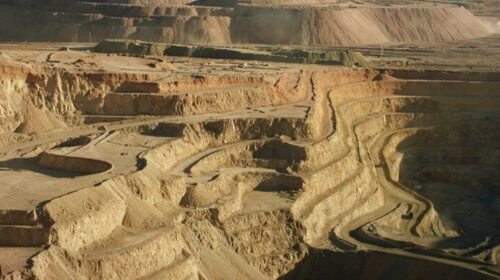Illegal gold mining “mafia” behind death threats | Uganda
In the week ending 21 June 2020, several media houses reported that Uganda’s State Minister for Minerals, Hon. Sarah Opendi, told the Parliament of Uganda that she had received death threats from anonymous people whom she described as “mafias promoting illegal gold mining.”
According to Hon. Opendi, the threats against her are intended to frustrate her efforts against illegal mining activities and other injustices in the mining sector that she is trying to stop.
We would like to express our strongest support for Hon. Opendi and the entire administration of the Ministry of Energy and Mineral Development as they go about their work of cleaning up Uganda’s mining sector.
The sector is increasingly under capture, by a combination of State and State-affiliated institutions as well as powerful individuals with strong political connections.
Having been recently placed in charge of the mining sector, we believe that Hon. Opendi’s tormentors are affiliated to some of those institutions and groups of people that have captured the sector. Their mission is to control her and influence her decision making in favour of their selfish interests.
We strongly encourage the Honourable Minister to remain steadfast, resist and expose those economic saboteurs and their anti-development evil self-seeking schemes.
We call upon the Government, Parliament, especially those MPs from mineral-producing regions and the Ugandan public to support Hon. Opendi’s efforts to clean up the mining sector.
It is unfortunate that Uganda’s mining sector continues to underperform despite having immense potential to contribute significantly to the country’s resource basket.
Uganda is endowed with favourable geological conditions associated with a rich and diverse mineral resource base with substantial economic potential.
Geological studies show that 300 million tonnes of Limestone deposits are estimated to be in Karamoja Region; over 6 million tonnes of Copper are anticipated in Kilembe; 7.3 million ounces of Gold deposits in West Nile and western parts of the country; 22 million tonnes of salt at Katwe in Kasese; while 231 metric tonnes of Iron Ore are estimated in Western and Eastern Uganda.
Given this immense mineral wealth, the Government of Uganda has prioritised mining in its Development Plans as one of those sectors that can enable the country to transform to middle income status.
However, little has been done over the years to address systemic governance bottlenecks and institutional underfunding that continue to cripple the sector.
Instead we are seeing a trend of a small group of people continuing to expand their grip on the sector, in the process undermining and diminishing the gate-keeper roles of the Directorate of Geological Survey and Mines (DGSM).
For example, the Police Minerals Protection Unit (PMPU) has taken over many of the supervisory and regulatory roles that the Mining Act 2003 vests in the DGSM. Many miners, especially those involved in the mining of Gold, Tin, Tantalum and Tungsten in Central, Eastern and Western Uganda have been harassed by this Force.
Another example is the Operation Wealth Creation initiative which is assuming some of DGSM’s roles in the sector, including investigations, dispute resolution, investment promotion and formalisation of the ASMs outside the mining sector’s policy and regulatory framework.
Uganda’s mining sector cannot progress with such institutional and operational contradictions, more so fuelled by inadequate political will and an incongruous application of the mining law and policy by different Government Institutions.
We therefore call upon:
- The Minister for Energy and Mineral Development to hasten the passing of the Draft Mining and Minerals Bill into law in order to put an end to some of the ongoing controversies relating to Artisanal and Small scale Mining, Licensing and others.
- The Ministry of Energy and Mineral Development and Ministry of Foreign Affairs to fast track the implementation of the Regional Certification Mechanism and all the other five Tools of the ICGLR Initiative Against the Illegal Exploitation of Natural Resources in accordance with the 2010 Lusaka Heads of States Declaration in support of Responsible Mineral Supply Chains of Tin, Tungsten, Tantalum and Gold (3TGs)
- The Parliament of Uganda to look into the operations of the Police Minerals Protection Unit, including how it was constituted, its chain of command and mandate vis a vis that of DGSM.
- The Office of the Inspector General of Government (IGG) and State House Anti-Corruption Unit to investigate allegations of corruption, abuse of office, extortion and accumulated wealth by the Senior Management of the Police Minerals Protection Unit.
- The Directorate of Geological Survey and Mines to reclaim and strengthen their monitoring role as the only institution mandated by law to regulate the mining sector.
- The Parliament of Uganda to strengthen their oversight function and also support DGSM to become more effective.
- The Uganda Human Rights Commission to investigate, document and address allegations of human rights abuses of Artisanal and Small-scale Miners and landowners in different mineral regions by the Police Minerals Protection Unit and other security agencies.
- The Police Minerals Protection Unit to operate within the law and respect the human rights of Artisanal and Small-Scale Miners and all the mineral supply chain actors.
- The Office of the Coordinator of Operation Wealth Creation (OWC) to respect the structures of managing the sector laid out in the law and operate under the guidance of the Ministry of Energy and Mineral Development.
- The Media to follow up and investigate injustices and excesses against Ugandans in the mining sector, especially in Gold and Tin mining areas in Central, Eastern and Western Uganda.
- The Chamber of Mines and Petroleum to pick interest in issues of Artisanal and Small scale Miners and convene an emergency crisis meeting for all mineral sector stakeholders to discuss, among others, the impact of the current crisis in the mining sector on the country’s competitiveness in attracting Foreign Direct Investment to the sector.
About ACEMP:
Africa Centre for Energy and Mineral Policy (ACEMP) is a not for profit Organization founded in 2012 under the laws of Uganda. ACEMP is an extractives sector policy and research think tank that espouses the values of equity, good governance, capacity building, socio-economic justice and shared benefits in the sustainable development and exploitation of minerals and petroleum resources in Uganda and Africa as a whole.
ACEMP provides a platform for sharing of extractive industries information for government policymakers, the mining industry, academia, media, mineral-rich host communities, sub-national governments, civil society and international development partners to identify policy gaps and find lasting solutions to challenges in the extractives sector.





